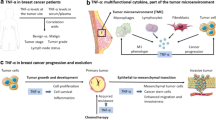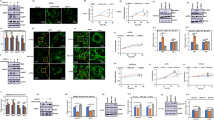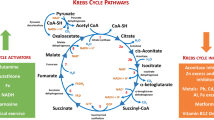Abstract
Recently, it was reported that reduction in serum adiponectin levels is correlated with the incidence of breast cancer. As an effort to explain this, we screened various human breast cancer cell lines to identify those in which proliferation is directly controlled by adiponectin. Among the five tested cell lines, proliferation of MDA-MB-231 cancer cell was significantly suppressed by adiponectin within the range of physiological concentration. Furthermore, prolonged adiponectin treatment caused cell growth arrest and even apoptosis of MDA-MB-231. This result is the first to show that adiponectin can directly control cancer cell growth and provides a rationale for the theory that reduction in plasma adiponectin levels could be a risk factor for breast cancer.
Similar content being viewed by others
References
Arita, Y., Kihara, S., Ouchi, N., Takahashi, M., Maeda, K., Miyagawa, J., Hotta, K., Shimomura, I., Nakamura, T., Miyaoka, K., Kuriyama, H., Nishida, M., Yamashita, S., Okubo, K., Matsubara, K., Muraguchi, M., Ohmoto, Y., Funahashi, T., and Matsuzawa Y., Paradoxical decrease of an adipose-specific protein, adiponectin, in obesity.Biochem. Biophys. Res. Commun., 257, 79–83 (1999).
Brakenhielm, E., Veitonmaki, N., Cao, R., Kihara, S., Matsuzawa, Y, Zhivotovsky, B., Funahashi, T., and Cao, Y., Adiponectin-induced antiangiogenesis and antitumor activity involve caspase-mediated endothelial cell apoptosis.Proc. Nat. Acad. Sci. U.S.A., 101, 2476–2481 (2004).
Calle, E. E., Rodriguez, C, Walker-Thurmond, K., and Thun, M. J., Overweight, obesity, and mortality from cancer in a prospectively studied cohort of U.S. adults.N. Engl. J. Med., 348,1625–1638(2003).
Dal Maso, L., Augustin, L. S., Karalis,.A, Talamini, R., Franceschi, S., Trichopoulos, D., Mantzoros, C. S., and La Vecchia, C., Circulating adiponectin and endometrial cancer risk.J. Clin. Endocrinol. Metab., 89, 1160–1163 (2004).
Fantuzzi, G., Adipose tissue, adipokines, and inflammation.J. Allergy. Clin. Immunol., 115, 911–919 (2005).
Fruebis, J., Tsao, T. S., Javorschi, S., Ebbets-Reed, D., Erickson, M. R., Yen, F. T., Bihain, B. E., and Lodish, H. F., Proteolytic cleavage product of 30-kDa adipocyte complement- related protein increases fatty acid oxidation in muscle and causes weight loss in mice.Proc. Nat. Acad. Sci. U.S.A., 98, 2005–2010 (2001).
Goktas, S., Yilmaz, M. I., Caglar, K., Sonmez, ?., Kilic, S., and Bedir, S., Prostate cancer and adiponectin.Urology, 65, 1168–1172 (2005).
Hu, E., Liang, P., and Spiegelman, B. M., AdipoQ is a novel adipose-specific gene dysregulated in obesity.J. Biol. Chem.,271, 10697–10703(1996).
Ishikawa, M., Kitayama, J., Kazama, S., Hiramatsu, T., Hatano, K., and Nagawa, H., Plasma adiponectin and gastric cancer.Clin. Cancer Res., 11, 466–472 (2005).
Kumada, M., Kihara, S., Ouchi, N., Kobayashi, H., Okamoto, Y., Ohashi, K., Maeda, K., Nagaretani, H., Kishida, K., Maeda, N., Nagasawa, ?., Funahashi, T., and Matsuzawa, Y., Adiponectin specifically increased tissue inhibitor of metalloproteinase-1 through interleukin-10 expression in human macrophages.Circulation, 109, 2046–2049 (2004).
Maeda, K., Okubo, K., Shimomura, I., Funahashi, T., Matsuzawa, Y., and Matsubara, K., cDNA cloning and expression of a novel adipose specific collagen-like factor, apM1 (AdiPose Most abundant Gene transcript 1).Biochem. Biophys. Res. Commun., 221, 286–296 (1996).
Mantzoros, C, Petridou, E., Dessypris, N., Chavelas, C, Dalamaga, M., Alexe, D. M., Papadiamantis, Y, Markopoulos, C, Spanos, E., Chrousos, G, and Trichopoulos, D., Adiponectin and breast cancer risk.J. Clin. Endocrinol. Metab., 89, 1102–1107(2004).
Matsuzawa, Y., Funahashi, T., and Nakamura, T., Molecular, mechanism of metabolic syndrome X: contribution of adipocytokines adipocyte-derived bioactive substances.Ann. N. Y. Acad. Sci., 892, 146–154 (1999).
Miyoshi, Y., Funahashi, T., Kihara, S., Taguchi, T., Tamaki, Y., Matsuzawa, Y., and Noguchi, S., Association of serum adiponectin levels with breast cancer risk.Clin. Cancer Res., 9, 5699–5704 (2003).
Okamoto, Y., Kihara, S., Ouchi, N., Nishida, M., Arita, Y., Kumada, M., Ohashi, K., Sakai, N., Shimomura, I., Kobayashi, H., Terasaka, N., Inaba, T., Funahashi, T., and Matsuzawa, Y., Adiponectin reduces atherosclerosis in apolipoprotein? -deficient mice.Circulation, 106, 2767–2770 (2002).
Ouchi, N., Kihara, S., Arita, Y., Maeda, K., Kuriyama, H., Okamoto, Y., Hotta, K., Nishida, M., Takahashi, M., Nakamura, T., Yamashita, S., Funahashi, T., and Matsuzawa, Y., Novel modulator for endothelial adhesion molecules: adipocyte-derived plasma protein adiponectin.Circulation, 100, 2473–2476 (1999).
Petridou, E., Mantzoros, C., Dessypris, N., Koukoulomatis, P., Addy, C., Voulgaris, Z., Chrousos, G., and Trichopoulos, D., Plasma adiponectin concentrations in relation to endometrial cancer: a case-control study in Greece.J. Clin. Endocrinol. Metab., 88, 993–997 (2003).
Rose, D. P., Komninou, D., and Stephenson, G. D., Obesity, adipocytokines, and insulin resistance in breast cancer.Obes. Rev., 5, 153–165 (2004).
Scherer, P. E., Williams, S., Fogliano, M., Baldini, G., and Lodish, H. F., A novel serum protein similar to C1q, produced exclusively in adipocytes.J. Biol. Chem., 270, 26746–26749 (1995).
Trujillo, M. E. and Scherer, P. E., Adiponectin-joumey from an adipocyte secretory protein to biomarker of the metabolic syndrome.J. Intern. Med., 257, 167–175 (2005).
Waki, H., Yamauchi, T., Kamon, J., Kita, S., Ito, Y., Hada, Y., Uchida, S., Tsuchida, A., Takekawa, S., and Kadowaki, T., Generation of globular fragment of adiponectin by leukocyte elastase secreted by monocytic cell line THP-1.Endocrinology, 146, 790–796 (2005).
Weyer, C., Funahashi, T., Tanaka, S., Hotta, K., Matsuzawa, Y., Pratley, R. E., and Tataranni, P. A., Hypoadiponectinemia in obesity and type 2 diabetes: close association with insulin resistance and hyperinsulinemia.J. Clin. Endocrinol. Metab., 86, 1930–1935 (2001).
Wolf, A. M., Wolf, D., Rumpold, H., Enrich, B., and Tilg, H., Adiponectin induces the anti-inflammatory cytokines IL-10 and IL-1RA in human leukocytes.Biochem. Biophys. Res. Commun., 323, 630–635 (2004).
Yamauchi, T, Kamon, J., Ito, Y., Tsuchida, ?., Yokomizo, T., Kita, S., Sugiyama, T., Miyagishi, M., Hara, K., Tsunoda, M., Murakami, K., Ohteki, T., Uchida, S., Takekawa, S., Waki, H., Tsuno, N. H., Shibata, Y., Terauchi, Y., Froguel, P., Tobe, K., Koyasu, S., Taira, K., Kitamura, T., Shimizu, T., Nagai, R., and Kadowaki, T., Cloning of adiponectin receptors that mediate antidiabetic metabolic effects.Nature, 423, 762–769 (2003).
Yamauchi, T., Kamon, J., Minokoshi, Y., Ito, Y., Waki, H., Uchida, S., Yamashita, S., Noda, M., Kita, S., Ueki, Eto, Akanuma, Y., Froguel, P., Foufelle, F., Ferre, P., Carling, D., Kimura, S., Nagai, R., Kahn, and Kadowaki, T., Adiponectin stimulates glucose utilization and fatty-acid oxidation by activating AMP-activated protein kinase.Nat. Med., 8, 1288–1295(2002).
Yamauchi, T., Kamon, J., Waki, H., Terauchi, Y., Kubota, N., Hara, K., Mori, Y., Ide, T., Murakami, K., Tsuboyama-Kasaoka, N., Ezaki, O., Akanuma, Y., Gavrilova, O., Vinson, C., Reitman, M. L, Kagechika, H., Shudo, K., Yoda, M., Nakano, Y., Tobe, K., Nagai, R., Kimura, S., Tomita, M., Froguel, P., and Kadowaki, T., The fat-derived hormone adiponectin reverses insulin resistance associated with both lipoatrophy and obesity.Nat. Med., 7, 941–946 (2001).
Author information
Authors and Affiliations
Corresponding author
Rights and permissions
About this article
Cite this article
Kang, J.H., Lee, Y.Y., Yu, B.Y. et al. Adiponectin induces growth arrest and apoptosis of MDA-MB-231 breast cancer cell. Arch Pharm Res 28, 1263–1269 (2005). https://doi.org/10.1007/BF02978210
Received:
Issue Date:
DOI: https://doi.org/10.1007/BF02978210




